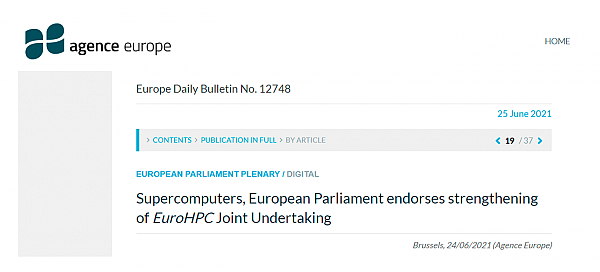Press Supercomputers, European Parliament endorses strengthening of EuroHPC Joint Undertaking
On Thursday 24 June, the plenary session of the European Parliament adopted (643 votes in favour, 9 against, 44 abstentions) the draft report on the proposal for a regulation revising the EuroHPC Joint Undertaking (see EUROPE B12729A2).
EuroHPC, which is based in Luxembourg, should enable the pooling of European and national resources to deploy a network of supercomputers. The first of these, acquired by the EU for €17.2 million, was inaugurated at the end of April in Slovenia.
“EuroHPC is an engine of transformation in line with the objectives of the European Union. It will help us fight climate change, modernise our cities and transport, develop new vaccines and face tomorrow’s problems”, was how rapporteur Maria da Graça Carvalho (EPP, Portugal) welcomed the report.
The draft report builds on three pillars - transparency, openness and simplification - to ensure accessibility for as many people as possible, especially SMEs, researchers and students.
“We need to pay particular attention to skills, where a lack of them would impact on the development of the joint undertaking. This should also serve to stop the brain drain and establish a real network between the data contained in the various centres of excellence”, stressed Ivo Hristov (S&D, Bulgaria).
The text was supported by a very large majority of the European Parliament’s political groups. “This text recognises the importance of the EuroHPC Joint Undertaking for sovereignty and its added value for European innovation. This will be the cornerstone of the digital decade. The EU’s digital transformation will not be possible without infrastructure like this”, the Commission summarised.
The Joint Undertaking was launched in September 2018 with a budget of €1.1 billion over the period 2019-2020. In September 2020, the European Commission proposed a new regulation to replace the regulation (2018/1488) establishing EuroHPC.
The new version of the regulation provides for an envelope of €8 billion for the period 2021-2033.
